International meetings in South Korea: review of the WHRCF and the UCLG World Congress
From 9 to 14 October 2022, the International Observatory on Violence against Women was in South Korea to participate in the World Human Rights Cities Forum (WHRCF) in Gwangju, and in the World Congress of UCLG taking place in Daejeon, in order to promote the role of local authorities in the fight against violence against women
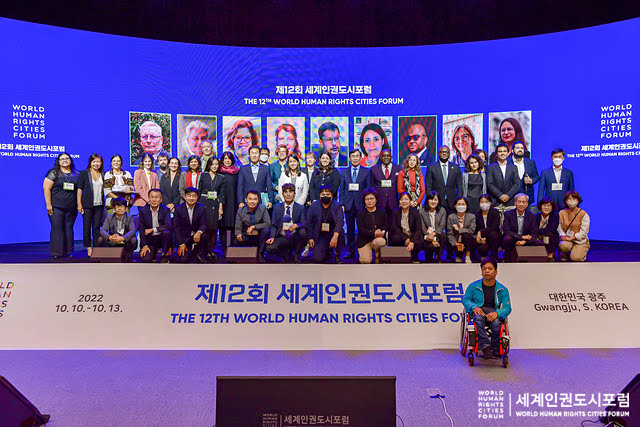

First step : Gwangju , Participation in the WHRCF and meetings with civil society
The Gwangju World Human Rights Cities Forum is an important event in the field of human rights and a platform for exchange and networking between local governments, human rights organisations, and activists. The Forum is organised every year by the Gwangju International Centre, the Commission on Social Inclusion, Participatory Democracy and Human Rights of UCLG (CISDPDH) and the Raoul Wallenberg Institute. During this 12th edition of the Forum, the theme of this year was “Climate Change and Human Rights”.
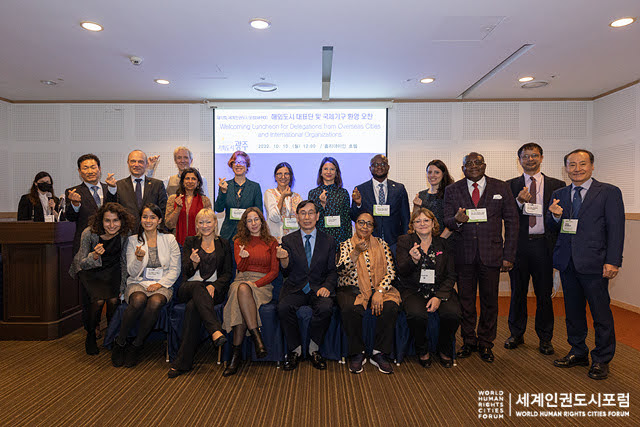
Opening lunch of the Forum in the presence of local elected officials @WHRCF
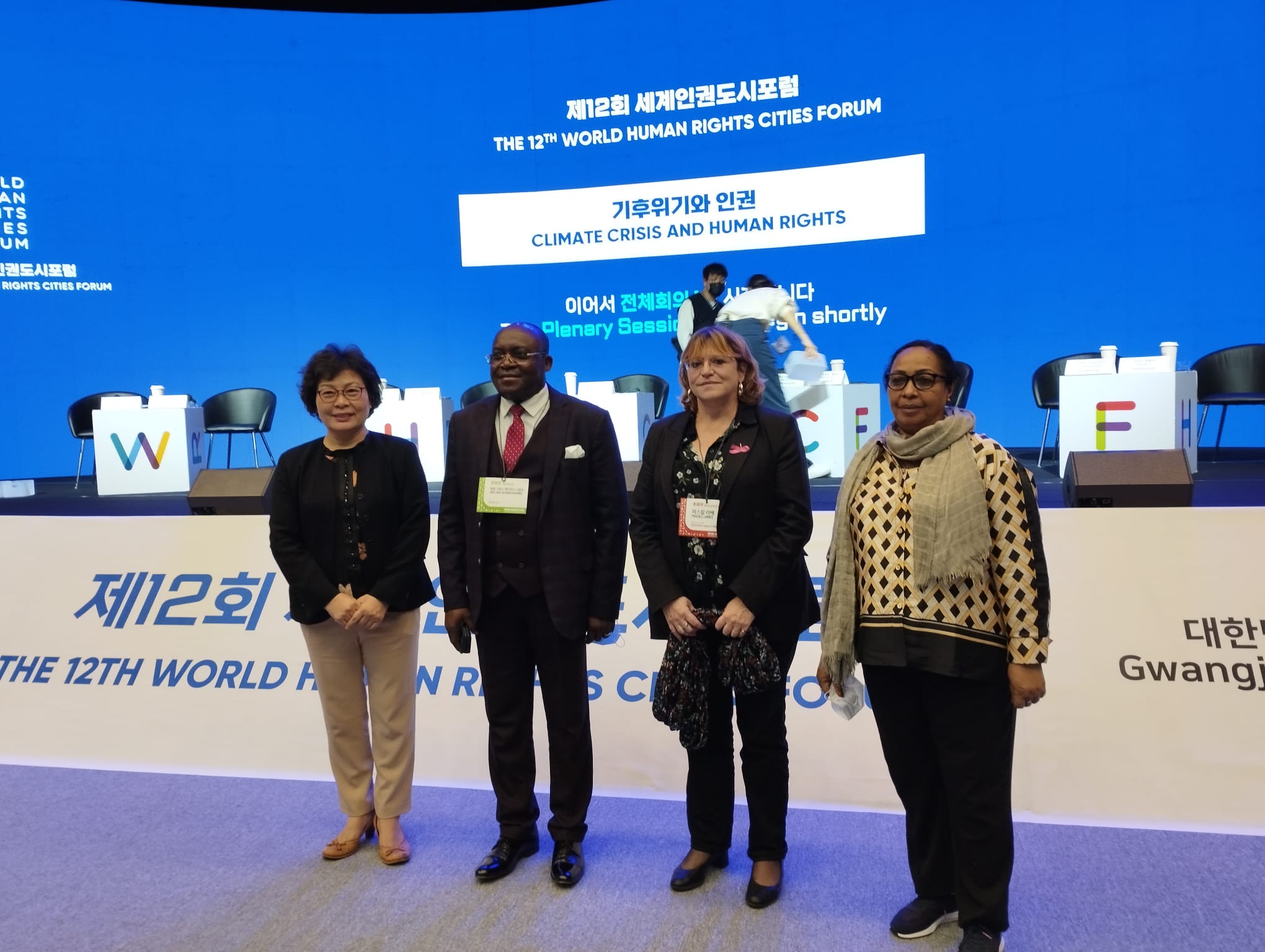
From left to right : the interpreter; Emile Gros Raymond Nakombo, Mayor of Bangui (Central African Republic); Pascale Labbé, Vice-President of Seine Saint Denis in charge of Gender Equality and the Observatory of Violence against Women (France); and Sitti Farouata Mhoudine, Governor of Ngazidja (Comoros) @OIVF
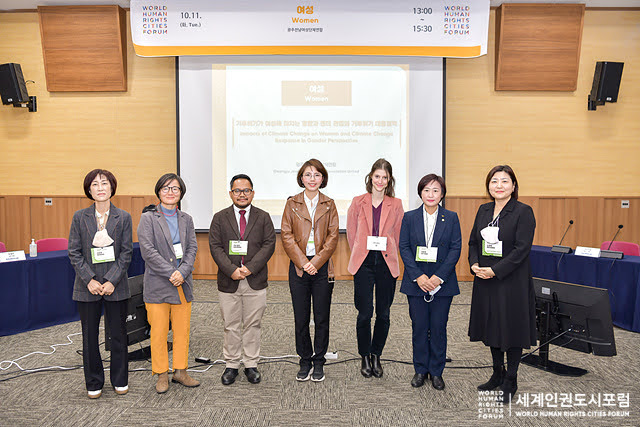
Participants of the “Women and Climate Change” panel @WHRCF
During the Forum, many interventions made the link between climate change and women’s rights. In particular, Zoé Cerutti, Project Officer of the International Observatory on Violence against Women, was invited to participate in a session on the impact of climate change on women. Indeed, although violence against women is not specific to a continent, territory or culture, certain contexts can exacerbate the risk of producing such violence. In particular, crises, such as the climate crisis, exacerbate the factors of violence against women.
In parallel to the Forum, the International Observatory met associations in the city of Gwangju that fight against violence against women. The delegation met with the Gwangju Jeonnam Women’s Association United, which brings together a dozen feminist associations, as well as the Gwangju Foundation for Women and Family, an association created in 2011 that participates in the development of public policies on equality between women and men.
These meetings were an opportunity to discuss the issue of cyberviolence in South Korea. In 2020, a case concerning an online cyberstalking and child pornography network on the Telegram network was uncovered and the heads of the network were arrested. Following this case, new measures were taken by the government to fight against online violence against women, including the creation of shelters for victims of violence through new technologies. In Gwangju, a centre welcomes these victims and offers legal and psychological support, as well as specific support for this type of violence, with help in gathering evidence of cyber-harassment or deleting data online.
The Gwangju Foundation for Women and Family conducted a study on cyber violence among 1,000 women aged 19 to 75 in the city of Gwangju to better understand the extent of the phenomenon. The most common types of technology-related violence against women in Gwangju are image-taking in public places without the victim’s consent (e.g. in public toilets) and the publication of sexual images without the victim’s consent. The majority of the perpetrators of online sexual violence (51.2%) are relatives of the victim. 85% of the women surveyed felt that the danger of sexual violence was severe to very severe. In the case of online sexual violence, this figure rises to 91.7% of the women surveyed who felt that the violence was severe to very severe.
Second step: Daejeon and the World Congress of United Cities and Local Governments (UCLG)
The UCLG Congress was held from 10 to 14 October 2022, and brought together local elected representatives from all over the world to define UCLG’s political priorities and consolidate the network around themes of common interest. Nearly 90 sessions were proposed to the participants, grouped under 3 themes: the Planet, the People and Governance.
In particular, many sessions addressed issues related to women’s rights such as the session “The Future of Feminist Municipalism” organised by UCLG Women which highlighted the need for feminist public policy with participatory and inclusive approaches that ensure that all voices are taken into account and represented in decision making; or the session “Inform Women, Transform Lives” organised by the Carter Centre aiming to identify municipal services under-used by women and how to make them more visible.
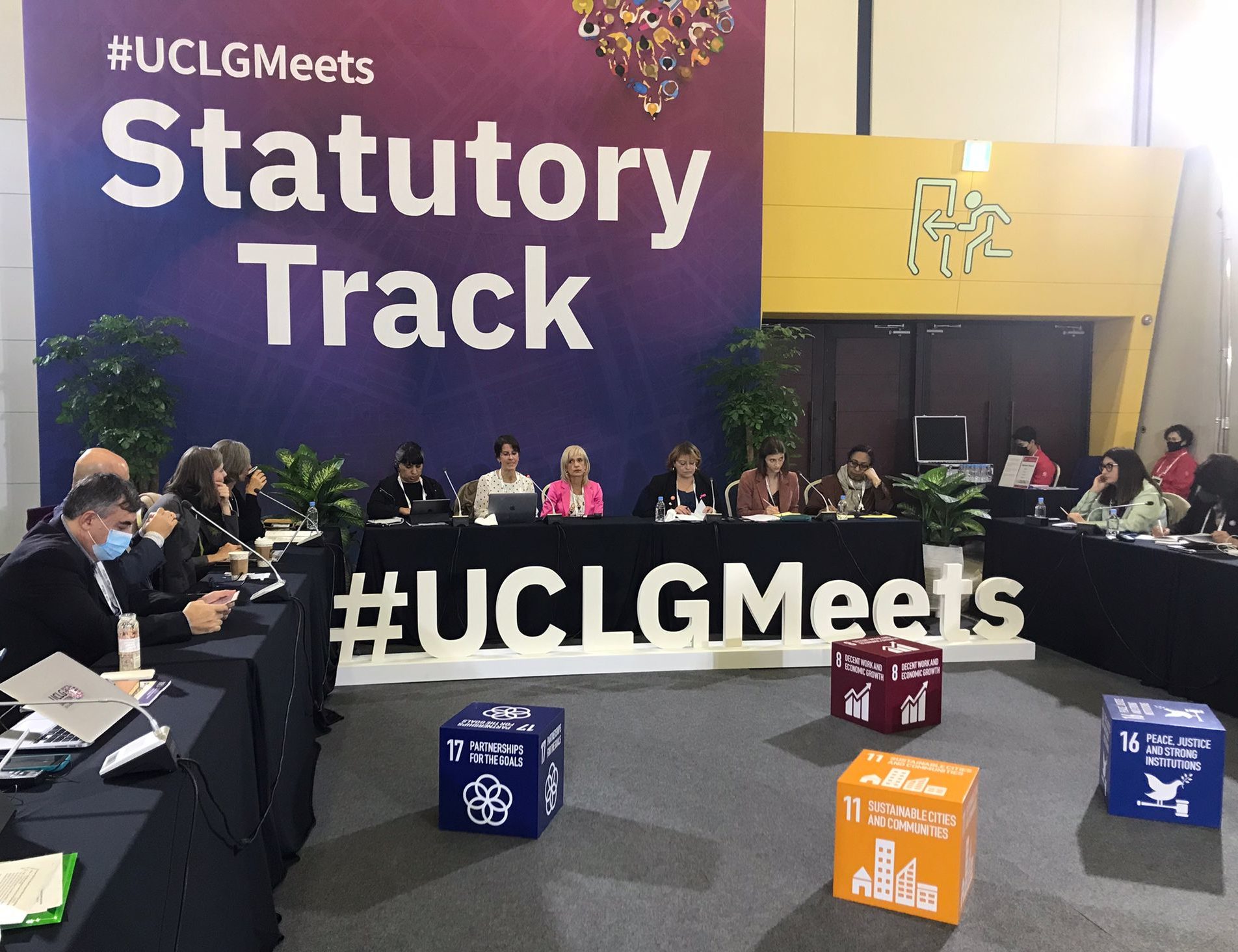
Session “Towards caring territories for women victims of violence” @CISDPH
The International Observatory on Violence against Women and the Commission on Social Inclusion of UCLG organised a session “Towards protective territories for women victims of violence” to promote the role of local authorities in the fight against violence against women. This session was opened by the UN Special Rapporteur on Violence against Women and Girls, Reem Alsalem, who recalled the place of the fight against violence against women within the Sustainable Goal 5 for gender equality and the role of local governments through 8 proposals for actions to be implemented at local level.
Many local authorities participated in this session to present their experiences in the fight against violence against women: Pascale Labbé, Vice-President of the Department of Seine Saint Denis in charge of gender equality and the Observatory of Violence against Women (France); Lucia Beamud, Councillor for Gender Equality for the City of Valencia (Spain); Shams Asadi, Director of the Human Rights Office of the City of Vienna (Austria); Rosario Olivares, Deputy Director for Gender Equality of the City of Santiago (Chile); Pilar Diaz Romero, Mayor of Esplugas de Llobregat (Spain); Sitti Farouata Mhoudine, Governor of Ngazidja (Comoros); Gissela Chala, Vice Mayor of Quito (Ecuador).
The speakers discussed the essential position of local governments in the fight against violence against women, as they are the public structures in direct proximity to the beneficiaries of public services. Furthermore, many participants recalled that public policies to combat violence against women must be global policies that take into account the different aspects necessary to support women in overcoming violence (psycho-social, legal, economic and housing support). This requires a partnership between different local authority services. Finally, the local authorities present insisted on training actions for professionals who work with women victims of violence in order to better identify violence and support these women.
These meetings around the Gwangju Forum of Cities for Human Rights and the UCLG World Congress allowed for fruitful exchanges with actors in the fight against violence against women around the world, laying the groundwork for a network of local authorities committed to combating violence against women.
Join the network
Elected officials, professionals and associations, international networks and organizations, researchers: we need you.



